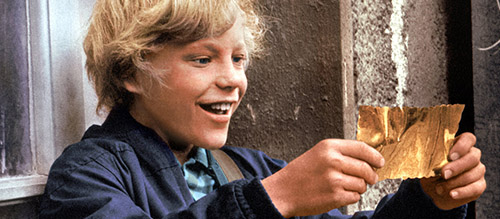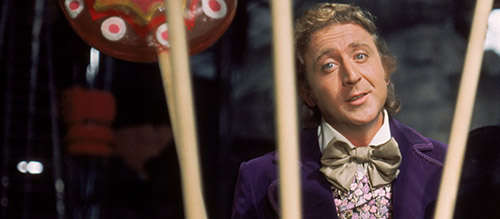Willy Wonka & the Chocolate Factory (1971)
Director: Mel Stuart
Screenwriter: Roald Dahl
Starring: Gene Wilder, Peter Ostrum, Jack Albertson, Julie Dawn Cole, Paris Themmen, Denise Nickerson, Michael Bollner, Roy Kinnear, Nora Denney, Leonard Stone, Ursula Reit, Gunter Meisner
Willy Wonka & the Chocolate Factory is the rare non-Disney film that seems to have been a part of almost everyone’s childhoods. More than just a piece of family entertainment, it has become an institution – a staple of youth cinema and a pop-culture treasure trove echoed throughout music, film and television since its release 50 years ago.
Charlie Bucket (Peter Ostrum) lives squarely on the poverty line, sharing a small, dilapidated house with his hard-working mother and four bedridden grandparents. Living off a diet of cabbage-water soup, a simple loaf of bread is a luxury. The one glimmer of hope for Charlie arrives in the form of a competition courtesy of world-renowned chocolatier and recluse, Willy Wonka (Gene Wilder). Wonka will finally open the gates and permit five entrants to see the inner workings of his factory, and all they have to do is find one of five golden tickets hidden within the millions of Wonka Bars being shipped around the globe. As one spoiled child after another finds their golden ticket, things look bleaker than ever for poor Charlie, until a stroke of luck puts that final ticket in his hands, inviting him to a world of pure imagination.
Adapted by Roald Dahl from his own book, with an uncredited shine and polish from David Seltzer, there has perhaps never been a better blend of adult and child entertainment in live-action film – cheeky, Python-esque moments of humour here, other moments of pure, unadulterated wonder there.
For the first 45 minutes, we are teased and titillated for what lies in store. School classes are instantly dismissed upon announcement of the competition. Breaking news reports reveal the winners who will gain entry to Wonka’s marvellous and mysterious factory. Scientists build algorithmic computers to help find the lucky chocolate bars containing the golden tickets. It’s a wonderfully ridiculous notion that the world would stop spinning for a chocolate factory, but it’s one that you totally buy into by the time Charlie finds that last fortuitous ticket.
All that build-up pays off.
Iconic though almost every character has become, this is undoubtedly Gene Wilder’s film. From the moment he steps onto the screen, you cannot take your eyes off him. As Wilder had reportedly intended, his opening pratfall-turned-summersault leaves you guessing what twists and tricks ol’ Wonka has up his sleeve next. Spike Milligan and Peter Sellers were initially eyed for the role, but in their hands Wonka may have felt more like a larger-than-life character. With his sparkling blue eyes and untameable hair, Wilder is Wonka, at once disarmingly charming and full of sarcastic wit, but unpredictable in more ways than either we, or Charlie and company, would ever expect. He may be the very definition of eccentric, but behind it all is a warmth that keeps you following closely behind, even when uncertain danger lurks around the corner.
One of the film’s greatest and potentially most polarising qualities is also one of the reasons it has endured: it’s not afraid to get weird, and at times even scary. As sweet as it can be, Stuart’s film also has considerable bite. Who could forget Slugworth, the spy who always seems to be peering in on each of the golden ticket winners, or the infamous boat ride from hell designed solely to traumatise the characters and audience alike?
In a film full of candy, everything is sugar-coated but the danger. As in many of his stories, Dahl does not tolerate bad behaviour, and Willy Wonka serves as another cautionary tale for developing minds and personalities. As the tour progresses, the number of attending children is whittled down, like a slasher film for preteens. On separate occasions the kids almost drown, fill with enough juice to burst their bodies, narrowly escape being sliced up by a giant fan, plummet towards the factory incinerator, and, in one case, are shrunken down to the size of an action figure. And how does everyone react? The parents, of course, are hysterical. Wonka, on the other hand, dismisses them with a pithy remark and a “they get what they deserve” attitude. More than just a moralistic story for children, these lessons extend to the parents too – no one wants a Veruca Salt in the family, after all.

And then there’s Charlie. Charlie, who is everything these other children are not – quiet, thoughtful, generous and understanding – asking for no attention while the others demand it. Of course, he is ultimately rewarded for his inherent goodness, and in that moment it is as though Wonka is permitted to share in the audience’s joy, as happy as we are to see the underdog win out in the end.
Seltzer’s rewrite turned the story into a musical, which was one change too many for Dahl who baulked at the idea and stepped away from the production. Watching the film now, it seems unthinkable to remove the songs. Leslie Bricusse and Anthony Newley’s musical numbers are every bit as important as Helen Colvig’s iconic costumes or Harper Goff’s rainbow-splashed production design. The purehearted optimism of “I’ve Got a Golden Ticket”; those first twinkling notes of “Pure Imagination”; the ever-adapting earworm that is the Oompa Loompa song – without them, the film would be robbed of a special kind of magic.
50 years on from its release, it may seem easy to poke fun at Willy Wonka & the Chocolate Factory – it has been parodied and memed to death by American television and the internet alike. It’s the kind of good humour that comes around with the most beloved properties – the ones that were experienced early in a lifetime and have only had their appreciation grow as the years go by.
There is no doubt that Willy Wonka, Charlie and their fellow characters will continue to touch hearts and minds for years to come. “Pure imagination”, indeed.
22/24
Written by Scott Z. Walkinshaw
You can support Scott Walkinshaw in the following places:
Twitter – @scottfuzz
Letterboxd – /scottfuzz


